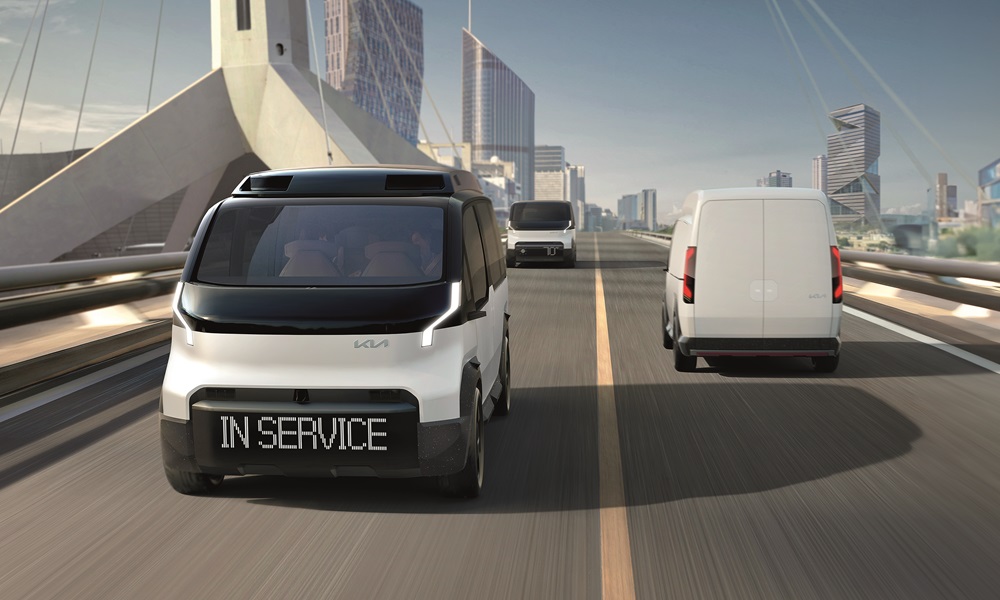CES 2024 saw Uber and Kia reveal more details on their upcoming collaboration. With the goal of enhancing electric vehicle offerings available on Uber’s mobility platform and supporting the global ride hailing leader in achieving its 2040 zero-emission goal, the partnership with Kia is seeking to produce Kia PBVs optimised for drivers and fleets as part of Kia’s ‘Platform Beyond Vehicle’ strategy in this field of the mobility market.
“PBVs will play a key role in the customisation of mobility, and by partnering with Uber, Kia aims to deliver industry-leading technology with advanced software and services to enhance the ride hailing experience,” said SeungKyu (Sean) Yoon, president & CEO, Kia North America, and Kia America.
“Drivers on the Uber platform will also have the ability to choose Kia vehicles with a comprehensive suite of offerings that will ease the ramp up of electrification and help achieve both Kia’s and Uber’s sustainability goals.”
Kia wants to identify optimal specifications for PBV models, with the possible further integration of technology and services to benefit drivers and ride hailing users alike.
“PBVs will play a key role in the transformation of mobility. This collaboration will enhance Kia’s PBV development, with optimised vehicles for drivers’ and riders’ needs,” said Sangdae Kim, Head of PBV Division, Kia. “This will focus on advanced software and services, with the integration of interactive In-Vehicle Infotainment and advanced safety technology.”
New driver and passenger experiences could be facilitated through the development of optimised operational solutions, building connected car experiences for all. Personalised riding environments, including climate and sound control, and interactive rear-seat entertainment systems, may also follow. Kia and Uber will collaborate on ways to moderate total cost of vehicle ownership by analysing the various PBV options and potential Battery as a Service (BaaS) subscription offerings to reduce initial vehicle purchase costs.
Currently in operation across several states in the U.S., Kia Flex allows drivers to choose
Kia vehicles for use on the Uber platform. The expansion of Kia Flex will offer drivers on the Uber platform a comprehensive vehicle package, including EV options, insurance, and maintenance.
“Drivers on the Uber platform are already EV early adopters, going electric six to seven times faster than the general population in the US and Europe,” said Susan Anderson, Vice President, Global Head of Business Development. “That’s great for all of us because when rideshare drivers go electric, communities see three to four times the emissions benefits compared with an average driver making the switch.“
Kia Connect diagnostic and preventive services will use data-driven solutions to detect signs of potential malfunctions, minimising maintenance outlay and downtime.
A vision for future mobility
The launch of Kia’s PBV business sees the brand commit to providing a varied range of customised vehicle types to meet customers’ individual requirements. Kia believes its new approach to PBVs can help solve the mobility challenges encountered by individuals and organisations with limited transportation options.
While ensuring consistency in design across all vehicles, Kia will create an ecosystem that fosters interaction between PBVs. With extensive modularity — including the ability to share features across all vehicles — PBVs will enhance versatility, opening up limitless possibilities to cater to the needs of both businesses and individuals.
In line with Phase One, various versions of the PV5 will be available, including Basic, Van, High Roof, and Chassis Cab versions. In the future, Kia also plans to introduce a Robotaxi model developed with Motional (a joint venture between HMG and Aptiv), which aims to provide a revolutionary autonomous hailing experience for passengers.
During Phase Two, the PBV ecosystem will be complimented by two further models, the ‘PV7’ and ‘PV1’, utilising cabinet and frame systems to enhance interaction and connectivity among vehicles based on the modular concept.
“Kia PBVs will initiate a new era of seamless everyday business and lifestyle solutions. We hope to make our customers’ lives easier and better, whether they’re stationary or on the move, offering exceptional flexibility and customisation through radical modularisation,” said Karim Habib, Executive Vice President and Head of Kia Global Design. “Untethered to any fixed place, and unbounded by the traditional restrictions of space, Kia PBVs offer users a blank canvas to reimagine their lifestyles and workstyles,” he added.
A PBV-dedicated EVO plant in Autoland Hwaseong, Korea, will implement a hybrid production approach, combining conveyor and cell-based methods. Through collaboration with global conversion partners, Kia will be able to offer conversion models for various PBV line-ups. The factory is set to become operational in 2025 and will have an annual capacity of 150,000 units.
The brand’s solutions for In-Vehicle Infotainment (IVI), Fleet Management Systems (FMS), and charging will leverage vehicle software-based data and AI technologies, further enabling customer-centric solutions, predictive maintenance suggestions to minimise downtime, and charging programs tailored to the customer’s business operating environment.
Kia’s PBV IVI solution aims to enhance daily life by recognising user preferences in real-time and providing relevant contextual data. It offers access to the Kia PBV App Market and third-party apps, ensuring customers have the latest information and entertainment content on the go. By connecting with business-specific apps previously limited to mobile devices, it improves service convenience and information reliability, providing a holistic user experience across different hardware form factors.
The fleet management solution for Kia PBVs allows customers to efficiently oversee multiple vehicles. It provides insights on sales, inventory, and deliveries, benefiting mobility and logistics businesses. Features include inventory monitoring, temperature control, and intelligent route planning for efficiency. The solution streamlines fleet management with real-time data and AI integration for predictive maintenance and optimal operational efficiency.
Kia’s EV charging solution optimises charging schedules for maximum efficiency. It considers battery charge levels, routes, schedules, and breaks.
Additionally, Kia aims to provide a total energy solution by utilising advanced charging infrastructure, allowing high-density energy batteries to power mobile devices and emergency equipment. This is made possible through innovations like Vehicle-to-Everything (V2X) technology.



